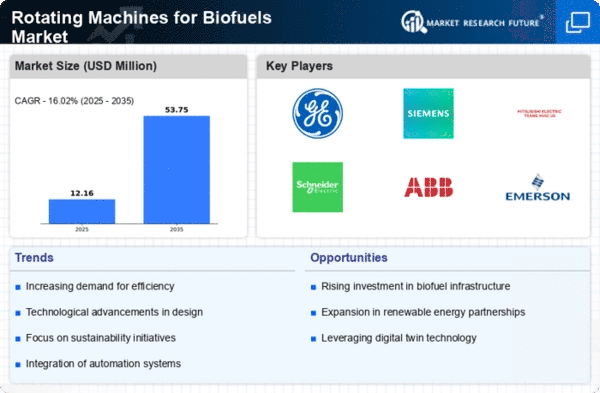Market Analysis
In-depth Analysis of Rotating Machines for Biofuels Market Industry Landscape
Biofuel production encompasses a series of methodologies, including fermentation, transesterification, gasification, and hydrothermal processing. The escalating demand for energy calls for sustainable solutions that minimize harm to the environment. Transitioning toward renewable energy sources becomes imperative due to their capacity to derive energy from readily available raw materials in our daily surroundings, including waste, vegetable oil, and wood. These resources offer accessibility and cost-efficiency, essential for sustainable energy production.
The allure of renewable energy lies in its utilization of commonplace materials, ensuring a cost-effective approach to energy production. The affordability of raw materials significantly impacts the entire production process, ultimately resulting in more accessible and cost-effective energy solutions beneficial for both end-users and producers. For instance, gasification represents a highly promising innovation in generating power from biomass sources. It involves a controlled process using heat, steam, and oxygen to convert biomass into hydrogen and other fuels without combustion, thus creating an energy source suitable for power generation.
The continual surge in energy demand emphasizes the necessity for energy sources that do not harm the environment. Renewable energy stands out as a viable alternative by harnessing resources abundantly available in our immediate environment. This reliance on common materials, including waste products and organic matter like vegetable oil and wood, underscores the practicality and cost-effectiveness of renewable energy sources.
The utilization of such locally available raw materials not only ensures a more sustainable approach to energy production but also significantly influences the economics of the entire energy generation process. Cost-effective raw materials play a pivotal role in shaping the production landscape, ultimately resulting in more affordable energy solutions that benefit both producers and consumers alike.
Gasification, as an exemplary innovation in this domain, represents a compelling technique for deriving power from biomass sources. By employing a controlled process involving heat, steam, and oxygen, gasification transforms biomass into hydrogen and other fuels without resorting to combustion. This efficient conversion process produces a versatile energy source suitable for power generation.
In conclusion, the pressing need for energy sustainability has propelled the focus towards renewable energy sources, capitalizing on the abundance and cost-efficiency of materials readily available in our everyday surroundings. Innovations like gasification exemplify the potential to harness these resources effectively, offering a promising avenue for sustainable and affordable energy production.


















Leave a Comment